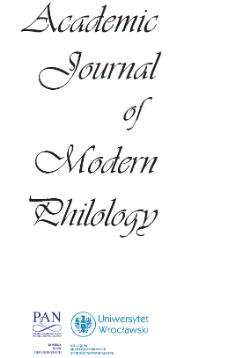A Socio-Cultural Aspect of Anti-language
A Socio-Cultural Aspect of Anti-language
Author(s): Monika PiechotaSubject(s): Semantics, Pragmatics, Sociolinguistics
Published by: Komisja Nauk Filologicznych Oddziału Polskiej Akademii Nauk we Wrocławiu
Keywords: anti-language; pragmatics; sociolinguistics; stigmatisation; multi-functionality; polysemy; the negative; symbol; culture; taboo
Summary/Abstract: The article has been devoted to the phenomenon of anti-language and the focal point of the paper refers to the analysis of socio-cultural processes involved in the formation and reception of anti-language. The analysis has been aimed at defining the circumstances of the occurrence of anti-language as well as determining its role and functions at both individual and collective levels. My general approach to the study of anti-language outlines the social functions which govern the emergence of anti-languages with the explicit reference to language, context and text. Kenneth Burke (1966) defines man as a symbol-using animal. In his “Definition of Man”, Burke draws attention to the concept of negativity when he argues that negatives do not occur in nature and they are solely a product of human symbol systems. According to Burke, “(...) language and the negative ‘invented’ man (...)” (Burke 1966: 9). The study has begun with the premise that anti-language permanently depicts an antagonistic attitude towards the official language, whereas the negative attitude towards anti-language translates directly into stigmatisation of its users. The negativity of the affix anti—in anti-language has been culturally and socially structured as antithetical to language. Nevertheless, language and anti-language do not necessarily forge a typical antithesis in a polar sense. Victor Turner (/1969/ 1975) employs the affix anti—for his term anti-structure and explains that the affix has been used strategically and does not imply radical negation. This paper seeks to revise the one-dimensional attitude towards anti-language and fortify its social significance with a new quality. The basis for the study of anti-language has been its multi-functionality and multifaceted character. A small corpus of anti-languages has been analysed in order to illustrate a complex and polysemic nature of this phenomenon.
Journal: Academic Journal of Modern Philology
- Issue Year: 2019
- Issue No: 8
- Page Range: 165-172
- Page Count: 8
- Language: English

